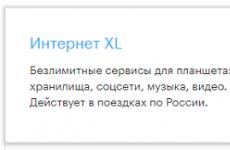Declension in the accusative case of the German language. Akkuzativ in German
As in Russian, in German there is accusative case (Akkusativ, abbr. Akk.) answering the questions of whom? What? Wen? Was? (V German also wohin? ). The case in German is indicated by the article, both definite and indefinite.
| Nominative (Them. P. ) | IN. P. ) | |
| Wer? Was? | Wen? Was? Wohin? | |
| masculine | der(ein) | den (eine) |
| Feminine | die (eine) | die (eine) |
| Neuter gender | das (ein) | das (ein) |
| Plural number | die (pl.) | die |
As can be seen from the table, the nominative and accusative cases in German are the same except for the masculine gender, where the article changes from DER (ein) to DEN (einen).
For example:
In German, prepositions are used with nouns in a certain case, which may not correspond to Russian. With the accusative case in German, prepositions are used:
fur, durch, ohne, um, gegen, bis, entlang
- Fur die Mutter - for mom
- Durch den Wald - through the forest, through the forest
- Ohne Jacke - without a jacket (used mostly without an article)
- um die Schule - around the school
- Gegen den Krieg - against the war
- Bis sechs Uhr - up to six hours (often used with other prepositions: bis auf, bis zu, bis vor)
- Den Fluss entlang- along the river (the preposition comes after the noun)
The prepositions für and um can merge with the article:
für das = fürs Liebe fürs Leben
um das = ums ums Zentrum der Stadt
In German, certain verbs can only be used with certain prepositions. (management of verbs) . These combinations should be remembered:
sich interessieren fur Akk. Ich interessiere mich für Literatur. be interested
es geht um Akk. Im Film geht es um den II. Weltkrieg. This is about…
sich handeln um Akk. Im 2. Kapitel handelt es sich um die Reformen von Peter I. Speech
it's about...
sich kummern um Akk. Anna kümmert sich um ihren alten Opa. Take care of somebody
kä mpfengegenAkk. Die Studenten kämpfen gegen Rassismus. fight against something
kampfen fur Akk. Die Völker kämpfen fur den Frieden. fight for anything
nennen Akk. Akk. Die Leute nannten ihn einen Diktator. call someone someone
es gibt Akk. In unserer Stadt gibt es einen großen Bahnhof. Available
storen Akk. Störe den Vater nicht bei der Arbeit! To bother someone
anrufen Akk. Ich muss dringend meine Schwester anrufen. call someone on the phone
kennen lernen Akk. Wann lernen wir deinen neuen Freund kennen? Get to know someone
Exercises / ÜBUNGEN
1. Check out the accusative tenses. Please note that when in Russian a phrase with a preposition is used, in German the preposition is absent and the accusative case is used. Fill in the gaps with the appropriate endings:
| Der Monat | Die Woche | Das Jahr |
| den ganz en Monat all month | die ganz e Woche | Das ganz e Jahr |
| den letzt__ Monat last month | die letzt__ Woche | das letzt__ Jahr |
| den vorig___Monat in the previous month | die vorig___Woche | das vorig___ Jahr |
| den nächst___Monat next month | die nächst___Woche | das nächst___ Jahr |
| jed___Monat every month | jed_Woche | jed___ Jahr |
| dies___Monat this month | dies___ Woche | dies___ Jahr |
2. Complete the sentences paying attention to the control of the verbs:
1. In meiner Heimatstadt gibt es (museum, train station, agricultural university, dairy, youth centre, supermarket)
2. Der Lärm stört (neighbours, my father, professor, my children, my grandmother).
3. Jeden Tag rufe ich (to parents, friend, husband, colleagues, family doctor) an.
Today we will touch noun topics and how to work with them in German.
As you have noticed, up to this point we have considered only verbs and the rules for working with them. For example, how to correctly say:
man who every evening comes with a woman in the cafe. They always order coffee and fruit cake. An hour later he pays and they leave.
Later we will say it in German.
The underlined words are in the Accusative case. (Akkusative) and answer the questions “who? What?" and where?"
I see (whom?) man.
He comes (Where?) in the cafe.
They order (What?) coffee and fruit cake.
Nouns in Accusative
In German it works like this:
| masculine | |
|---|---|
| Nominative– wer? was? (who what?) |
This is a man. Das ist der (ein) Mann. This is a park. Das ist der (ein) Park. |
| Accusative– wen? was? what? (who? what? where?) |
I see a man. Ich sehe den (einen) Mann. He goes to the park. Ergeht in den Park. |
| Feminine | |
|---|---|
| Nominative– wer? was? (who what?) |
This is a woman. Das ist die (eine) Frau. This city. Das ist die Stadt. |
| Accusative– wen? was? what? (who? what? where?) |
I see a woman. Ich sehe die (eine) Frau. She is going to the city. Sie fährt in die Stadt. |
Only the masculine article changes Der - Den. Everything else is unchanged:
Verb haben
Haben - to have.
When using this verb, all nouns related to it are in the Accusative.
The verb does not change according to the rules:
| haben | |
|---|---|
| Ich | habe |
| Du | hast |
| Er, sie, es | hat |
| Wir | haben |
| Ihr | habt |
| Sie, sie | haben |
Negation
German nouns are negated with the negative article kein(e) .
This is a man. It's not a man, it's a woman. She doesn't have a man.- Das ist ein Mann. Das ist kein Mann, das ist eine Frau. Sie hat keinen Mann.
This is an apartment. This is not an apartment, this is a house. I don't have an apartment.- Das ist eine Wohnung. Das ist keine Wohnung, das ist ein Haus. Ich habe keine Wohnung.
This is a car. It's not a car, it's a bus. I do not have a car.– Das ist ein Auto. Das ist kein Auto, das ist ein Bus. Ich habe kein Auto.
These are friends. They are not friends. He has no friends.— Das sind Freunde. Sie sind keine Freunde. Er hat keine Freunde.
And here is the text that was at the beginning. Now you can easily understand almost all the grammatical structures that are present in it - you already know quite a lot!
I work in a cafe and every day I see man who every evening comes with a woman in the cafe. They always order coffee and fruit cake. An hour later he pays and they leave.
Ich arbeite in dem (in dem = im) Cafe und sehe jeden Tag den Mann, der jeden Abend mit der Frau in das (in das = ins) Cafe kommt. Sie bestellen immer den Kaffee und den Obstkuchen. In einer Stunde bezahlt er und sie gehen weg. (weggehen - to leave)
German prepositions (prev.), as well as Russian ones, and prev. in other languages refer to service units speech. Despite this, it is from before. depends on which case (pad.) of the noun to use.
There are several classifications of German prepositions, for example, according to the meaning (, time, reason, etc.) or according to the cases with which they are used. This is the approach we recommend.
All prev. can be divided into several groups:
- always requiring Dative (Dat.) falling;
- requiring an accusative fall.;
- those that can be used with both Dat. and Accusative;
- those that, as a rule, are used with Genitive (Gen.) falling;
Prepositions with the Dative case
We suggest teaching them with the help of a small rhyme:
Mit, nach, aus, zu von, bei
Just give Dativ.
These prev., regardless of their value, always require Dates. fall:
Ich komme aus der Ukraine (place).
Aus diesem Grund muss ich leider auf den Deutschkurs verzichten (reason).
Ich fahre morgen mit dem Zug nach Berlin (instrument).
Ich bin seit 10 Jahren mit Karl befreundet (jointness).
Beim Spielen sieht er sehr konzentriert aus (time).
Bei der Schule gibt es einen schönen Spielplatz (place).
This also includes pre. seit and gegenüber, entgegen, entsprechend and less commonly used fern, getreu, mitsamt, nahe, zuliebe.
Previous nach, gegenüber, entsprechend, getreu and entgegen can come after a noun:
Meiner Meinung nach ist Aishwarya Rai die schönste Schauspielerin der Welt.
Unser Haus steht dem Krankenhaus gegenüber.
Seinen Gewohnheiten getreu hat er sich zum Vorstellungsgespräch verspätet.
Meinem Rat entgegen studiert sie Philosophie.
Er hat sich dem Maskenball entsprechend verkleidet.
Prepositions with accusative case
To this group before. relate: gegen, für, durch, wider, um, ohne, bis, je, kontra (contra), betreffend, via. At the same time, it doesn’t matter what meaning they have in the sentence, but they always require the Accusative Fall next to them ..
Die Demonstranten protestieren gegen die Atomkernenergie.
Aus Zorn schlug er mit der Bein gegen die Wand.
Er hat sein Auto gegen 3000 € verkauft.
Ich bin gestern gegen 10 Uhr aufgestanden.
Previous betreffend can also be in postposition:
Diese Frage betreffend habe ich nichts Neues zu sagen.
Prepositions with accusative and dative cases
This group includes primarily places: an, auf, hinter, in, neben, über, unter, vor, zwischen. Date pad. is used to express a place (the question is where?), and the Accusative is used to express the direction (the question is where?).
Die Brille liegt auf dem Tisch. - Wo liegt die Brille? — Dative
Ich habe meine Brille auf den Tisch gelegt. – Wohin habe ich meine Brille gelegt? - Accusative.
Ich war gestern nicht in der Schule. – wo war ich nothing? – Dative.
Ich gehe heute nicht in die Schule. – wohin gehen ich nicht? – Accusative.
Previous an, in, neben, über, unter, vor, zwischen can also be used with adverbs of time. In this case, they are used from Date. fall:
Unter der Woche habe ich keine Zeit für die Hausarbeit. — Wann? – Dative.
Im Sommer ist es sehr schön in der Krim.
Ich habe ihn vor drei Jahren kennengelernt.
With two pads. used before. entlang. However, it always has a spatial meaning (along, parallel to the street, river, terrace, etc.). Pad. the noun in this case depends on the position of the previous one itself: if it precedes the noun, then it requires Date. pad., if it stands after it - Accusative:
Entlang dem Fluss gibt es einen Fahrradweg. — Dative
Den Fluss entlang gibt es einen Fahrradweg. - Accusative.
Prepositions with Genitive
This is the most numerous and the most “problematic” group, since a change in the language norm is currently taking place, and the previous ones, which until recently required Genus next to them. pad., can be used with the Dative.
So, with Rod. pad. used before: außerhalb, innerhalb, während, abseits, jenseits, diesseits, inmitten, oberhalb, unterhalb, unweit, angesichts, anlässlich, aufgrund, bezüglich, dank, hinsichtlich, infolge, mangels, trotz, um…willen, wegen, zwecks, laut, anhand, anstatt, laut, mithilfe, mittels.
The whole problem in studying these pre. is that they can also be used with Dat. (usually with nouns in plural, which do not have an article or adjective, since the Genitive form is pad. in this case is not clear). These same pre. can be used together with the previous von and Dative case:
Während dieser Woche (pronoun indicates Gen. case)
Während 10 Tagen (ending n in a noun indicates Dat. fall.).
Mithilfe meiner Eltern (the pronoun indicates the Rod. fall.).
Mithilfe von Peters Eltern (we can't determine the noun from the noun, so we use von + Dativ).
Innerhalb eines Jahres (Gen. case is indicated by the article and the ending of the noun)
Innerhalb 2 Monaten/ von 2 Monaten(in Rod. pad. it would have to be innerhalb 2 Monate, but this form does not contain markers that clearly express Genitive, so 2 options for Dates are used. case).
Trotz unserer Unterstützung verlor die Mannschaft das Spiel (Gen. dep. expresses a pronoun).
Trotz Beweisen wurde Verdächtige freigesprochen (in Rod. Pad., trotz Beweise would be correct, but due to lack of markers, Date. Pad. is used).
Studying the German prev., It is necessary to dwell on the following aspect. Some pre. always merge with the definite article:
Ich sitze am Tisch.
Ich gehe ins Theatre.
Beim Putzen höre ich immer Musik.
Exception! If the noun with which the prev is used is attached subordinate clause, then prev. do not merge with the article:
Ich sitze an dem Tisch, den mein Opa selbst gemacht hat.
Ich gehe in das Theatre, in dem mein Freund heute Hamlet spielt.
Exercises for German prepositions
The accusative case is basically the case of the German object directly related to the verb, the case indicating the direction of this or that action, for example:
Erschreibt einen Artikel— He is writing an article
Ich lese die heutige Zeitung— I'm reading today's newspaper
Er liet das neue Buch— He is reading a new book.
The accusative case answers questions whom? What? Where? (wen? was? wohin?)
An example of using the accusative case with the question "where?": Ich gehe in die Bibliothek- I'm going (where?) to the library.
Let's compare two Russian sentences:
1. The car turned the corner.
2. I noticed this car.
In the first case, the actor is the machine. The word machine is in the nominative case (who? what?), as it is called here, the figure is called. In the secondIn this case, the machine turns from a doer into an object (here, observations). This is the so-called accusative case (blame, blame whom? what?).
Machines A turns into machines at , that is, it changes the ending.
Now let's see what happens in a similar situation in German:
Der Zug geht um halb zwölf. - The train leaves at half past eleven.
Ich nehme den Zug. - Literally: I'll take this train. (I'll ride this train)
In the nominative case, the words answer the questions who? What? (wer ? was?), and in the accusative - to the questions of whom? What? (wen? was?).
Here complete table declensions of German nouns:
The last line contains the accusative Akkusativ, which is what we are talking about in this article. As you can see, the masculine article DER has become DEN, this is exactly what we observed in the sentence Ich nehme den Zug. - Literally: I'll take this train.
More details about the German accusative case in the video:
Complete declension table for nouns, adjectives and pronouns in Nominativ:

Let's look at a few more examples of the use of the accusative case in German:
1) Often the accusative case of a thing or a person is combined with dative person :
Ich will dir meine neue Arbeit zeigen - I want to show you my new work
In such cases, the accusative case is the case of the complement to which the given action is directly directed, and dative is the case of the complement that is only affected by the given action.
The double accusative case depends on some verbs:
Sie nanten ihn einen Sonderling They called him a strange person (eccentric).
Some verbs form with single-rooted or other nouns close to them in meaning in the accusative case, phraseological units of an amplifying nature. In such cases, the noun is accompanied by a definition (an adjective, less often a noun), for example:
einen harten Kampf kämpfen - to wage a fierce (stubborn) fight
bittre Tränen weinen - to cry bitter tears
den Schlaf des Gerechten schlafen - sleep the sleep of the righteous.
2) Much less often the accusative case is used as a circumstance of time or even less often as a circumstance of place
jeden Morgen - every morning,
jeden Tag - every day,
diesen Sommer - this summer,
einen Weg gehen, ziehen, kommen - go, march, come (one way or another).
3) special case The use of the accusative case is the so-called accusative independent, which is translated into Russian either by a turnover with a preposition, or by a turnover with a gerund or participle.
4) A special turnover, also available in Latin, represents a combination of the accusative case with the infinitive of some verbs.
This turnover in most cases is translated into Russian by a subordinate clause.
Wir hören ihn kommen - We hear that he is coming (here).
Wir sehen die Kinder spielen - We see children playing or: we see children playing.
Er fflhlt die Hand schmerzen - He feels his hand hurt.
However:
Das macht mich lachen - This makes me laugh (this makes me laugh).
Compare also the following extract from Claudius's novel, where
1) a subordinate clause introduced by the relative adverb wie. And
2) turnover accusativus cum infinitivo:
| abgeben | give away | Sie möchte einen Kinderwagen abgeben. | She wants to give the stroller. |
| abholen | go after someone | Ich hole dich ab. | I'll pick you up. |
| absagen | refuse from something | Ich sage meinen Arzttermin ab. | I refused to see a doctor. |
| abschließen | close | Bitte schließen Sie die Haustür ab 22 Uhr ab. | Please close the door at 22:00. |
| abstellen | set aside | Wo stellst du dein Fahrrad ab? | Where did you leave (park) your bike. |
| abholen | go after someone | Ich hole dich ab. | I'll pick you up. |
| anhalten | stop | Erhalt das Taxi an. | He stops a taxi. |
| ankreuzen | mark (cross) | Kreuzen Sie das richtige Wort an. | Mark the correct answer. |
| anmachen | include | Anna macht den Fernseher an. | Anna turns on the TV. |
| anrufen | call somebody | Rufe mich morgen an! | Call me tomorrow! |
| anschauen | watch (view) | Schauen Sie die Fotos an. | Look at the photos. |
| anstellen | hire | Die Firma stellt viele Menschen an. | The firm employs many people. |
| aufhangen | hang up (hang up) | Hangen Sie Plakate im Kursraum auf. | Hang posters in the audience. |
| ausfull | fill | Fullen Sie bitte das Formular aus. | Please fill in the form. |
| ausgeben | spend | Familie Meier gibt viel Geld aus. | The Mayer family spends a lot of money. |
| ausmachen | turn off | Um vier macht er den Computer aus. | At four o'clock he turns off the computer. |
| auspacken | unpack | Peter and Tom packen die Kartons aus. | Peter and Tom are unpacking the boxes. |
| austauchen | exchange | Sie tauschen ihre Addressen aus. | They exchange addresses. |
| auswahlen | choose | Wählen Sie ein Foto aus. | Choose one photo. |
| backen | bake | Habt ihr drei Kuchengebacken? | Are you baking three pies? |
| beachten | pay attention to | Bitte beachten Sie die Hinweise. | Please pay attention to the comments. |
| beantworthen | respond to smth. | Niemand kann diese Frage beantworten. | Nobody can answer to this question. |
Let's compare two Russian sentences:
The car turned a corner.
I noticed this car.
In the first case, the actor is the machine. Word car is in the nominative case (who what?), as it is called here, the doer is called. In the second case, the machine turns from a doer into an object (here, observations). This is the so-called accusative case. (blame, blame who? what?).
Car turns into car, that is, it changes the ending.
Now let's see what happens in a similar situation in German:
Der Zug geht um halb zwölf.- The train leaves at half past twelve.
Ich nehme den Zug. - Verbatim: I'll take this train.
As you can see, unlike the Russian language, it is not the ending that has changed here, but the article. Der Zug- in the nominative case (Nominative), den Zug- accusative (Akkusative). In the nominative case, words answer questions Who? What? ( wer? was?), and in the accusative - to questions whom? What? ( wen? was?). But when you speak German, you no longer have time to control yourself with questions. Therefore, it is easier to focus on what the given word represents: the agent or the object of the action. If the object of the action is Akkusative. Just imagine an arrow (->) - and you can't go wrong. Moreover, the object of the action must be without a preposition, since the preposition, as in Russian, changes everything. Compare: Did the job. Got the job done. In other words, the arrow should lead directly to the object.
Proverb: Übung macht den meister. “Exercise makes a master.
So far, we have dealt with the masculine gender, where the article der changed to den. Let us now observe what happens in the remaining genders and in the plural:
Neuter gender (n): Ich nehme das Taxi. - I'll take (it) a taxi.
Feminine (f): Ich nehme die Straßenbahn. - I'll take (this) tram.
Plural (pl): Ich nehme die Briefmarken. I will take (these) stamps.
As you can see, nothing happens. Accusative does not change the nouns of the middle and female, it does not affect the plural.
Therefore, you need to remember: Accusative - this is only for the masculine gender, onlyder onden !
What if the article is indefinite?
Ich trinke eine Milch, ein Bier und ein en Wein. I will drink milk, beer and wine.
(I will take such a risk for the sake of grammar.) Where is the masculine word here? Right, der (ein) Wein. IN Accusative ein moved to einen, adding -en.
Means, der -> den, ein -> einen(kein -> keinen, mein -> meinen). All on-en .
Note that after the expression es gibt (have, have) need to use Accusative(for the simple reason that this expression is literally translated it gives... whom? What?):
Es gibt hier ein en biergarten.– There is a beergarten (“beer garden”: a beer garden under the trees).
To express a span of time (->) also used Accusative:
Ich war dort den ganz en Tag.– I was there the whole (‘whole’) day.
Ich gehe jed en Tag Dorthin.– I go there every day.
A noun can be replaced by a pronoun ("instead of a name") when it is already clear who or what is being discussed.
Ich kenne den Mann.- I know this man.
Ich kenne ihn. - I know him.
Here we have Accusative- And masculine. As well as der changes to den, pronoun er (he) changes to ihn (him). This is easy to remember, because everywhere -r goes into -n.
But you can not use special pronouns (er, ihn), you can just leave out the definite article - and it will be the same, only a little more familiar:
Ich kenne den. - I know him (this). Der ist mein Freund. - He is my friend.
In other genera (sie - she, es - it) and in the plural (sie - they) no change occurs. Accusative = Nominative. That is, literally, it says:
I know her, I know it, I know them.
For example:
Ich kenne die Frau, ich kenne die (sie). – I know this woman, I know her.
Ich kenne das Buch, ich kenne das (es). – I know this book.
Ich kenne die Bücher, ich kenne die (sie). I know these books, I know them.
Ich kenne Sie. - Do I know you.
Polite form Sie in German taken not from You, and from They. That is, politely addressing you, they say: I know they.
As for the other so-called personal pronouns (denoting persons) in Nominative and in Accusative, then it is best to remember them in examples:
Ich liebe dich. - I love you.
liebst du Mich? - Do you love me?
Seht ihr uns? - Do you see us?(Ihr- this is when with each of the interlocutors on You.)
Wir sehen euch. - We see you.






